Zakats and Ketupats: Understanding and Celebrating Hari Raya 2024!
It’s what 1/4 of the world’s population is celebrating!
- Ramadan is the one-month period before festivities ensue, where Muslims fast daily as a reminder of the sufferings of the less fortunate and to be closer to God.
- Fasting takes place from dawn to dusk, with no food or drink - not even a drop of water - and can be as long as 19 hours, depending on where you are!
- Hari Raya Puasa or Eid al-Fitr is the joyful celebration after Ramadan, a period for reconciliation, where all is forgiven and forgotten, and bygones are allowed to be bygones.
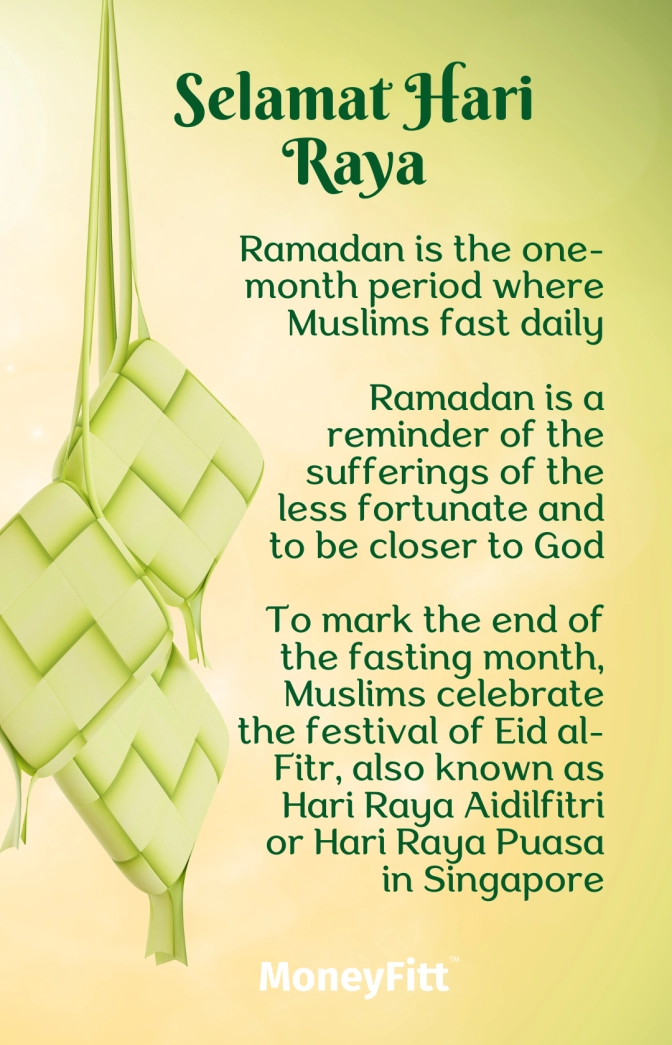
Congratulations! You have made it to the end of Ramadan! This Islamic holy month sees Muslims worldwide (except the sick, elderly, pregnant or menstruating) abstain from eating and drinking from dawn until dusk. This is done while doing charitable deeds and acts of compassion, with fasting as a reminder of the suffering the less fortunate face.
To mark the end of the fasting month, Muslims celebrate the festival of Eid al-Fitr, also known as Hari Raya Aidilfitri or Hari Raya Puasa in Singapore. (‘Hari Raya’ is Malay for ‘Grand Celebration Day.’)
Muslims begin the day by eating something sweet before partaking in a prayer service shortly after dawn, followed by a short sermon. After prayers, people will congratulate one another as they head home.
Traditionally, it is celebrated for three days, though the number of days declared as a public holiday will vary from country to country.
Besides the massive feast held at its end, the religious holiday is a time for forgiveness and making amends. Ramadan is a period of sober repentance for Muslims. Adherents of the faith worship and engage in acts of compassion and fast from dawn to dusk for approximately 30 days.
Hari Raya is spent visiting loved ones, relatives and neighbours, accepting traditional desserts and sweets as you move from home to home, often in your home town (where heading home is happily known as ‘balik kampung’, literally ‘return to village’ in Malay.)
Whether you plan to visit your Muslim friends during Hari Raya Puasa or head down to one of the many night bazaars such as the one at Geylang Serai in Singapore, here are some interesting things about Hari Raya Puasa you may not know.
Fun fact: Hari Raya Puasa is different from Hari Raya Haji, the Festival of Sacrifice, which falls 70 days after Ramadan, marking the end of the annual holy pilgrimage to Mecca. Unless somebody refers explicitly to Hari Raya Haji, you can safely assume it's Hari Raya Puasa!
What Is Ramadan?
Ramadan is the one-month fasting period when Muslims fast daily from before dawn till sunset. It can last between 11 and 19 hours depending on whereabouts in the world you happen to be, from 18-19 hours in Greenland to 11-12 in Chile and NZ. To be fair to Muslims in the most extreme northernmost parts of the world where the sun may not set during Ramadan, they have been allowed to follow the timings in Mecca (in Saudi Arabia) or the nearest Muslim country!
Fasting during Ramadan means abstaining from all food or drink, including water and chewing gum. Besides not eating or drinking, Muslims are forbidden from smoking, sexual activities, gambling, swearing, gossiping, fighting, lying, cheating, etc.
The pre-dawn meal is called sahur or suhoor and is all you can have until the evening. Usually, a high-protein meal and a lot of water are recommended. A top tip is to finish eating at least half an hour before the fast to have time just to sip and not chug your water!
After the official end of the fasting hours, Muslims take ‘iftar’, or ‘buka puasa’ in Malay. Iftars can be social events where people congregate to eat and socialise.
The importance of fasting among Muslims cannot be overemphasised. As the period leading up to the festival, Ramadan is a period of sober repentance for Muslims. The purpose is to cultivate self-discipline. As one of Islam’s five pillars, the act of fasting is done for atonement, to express gratitude and empathy for the needy.
After a month of fasting, Hari Raya Eid al-Fitr (or Aidilfitri) marks the end of Ramadan as Muslims celebrate. The principal reason for fasting during Ramadan is to remind Muslims of self-control and submitting to Allah, the holy one, to achieve greater ‘taqwa’, or consciousness of God. Even little kids are taught to fast when they are young.
When Does Ramadan Take Place?
Hari Raya Puasa is celebrated annually and determined by the Islamic lunar (“Hijri”) calendar, with 29 to 30 days long months. As a result, Ramadan begins 10 to 12 days earlier each year (if you’re using the solar Gregorian calendar)!
As with the first day of Ramadan, the first day of Hari Raya Aidilfitri, or Eid, officially depends on when the new moon is seen by local religious authorities. However, in some countries, the date is set in advance.
Fun fact: since the lunar year is shorter than the solar year by 11 days, Muslims will observe Ramadan twice in 2030 (on January 6 and again on December 27!)
Preparations for the Festival of the Breaking of the Fast
Hari Raya preparations are visible from about one month before the festival in a country such as Singapore, where there are many Malays and other Muslims. Geylang Serai, where Muslims traditionally gather, is filled with large crowds during Ramadan. Bazaars sell various festive items for Muslims, including traditional and not-so-traditional food!
At night the place is lit up with glittering lights. Many Muslims go there to buy food to bring home when they are allowed to break the fast (i.e. buka puasa.)
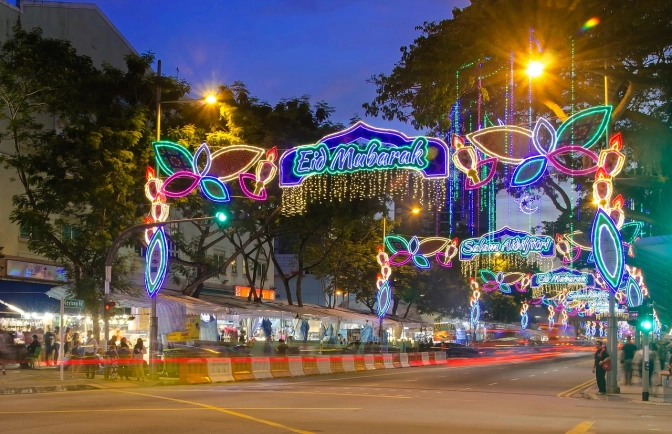
Seeking Reconciliation
Hari Raya is a festival symbolising purification and renewal, which goes beyond just a celebration surrounded by loved ones and delicious food. Instead, it is a time to foster relationships between families and friends, and it is encouraged to forgive and forget all the conflicts from the previous year.
The general custom involves younger family members asking for forgiveness from their elders before and during the house visit. They would get on their knees, placing their forehead on the hand of the elders and saying ‘maaf zahir dan batin’ in Malay, which translates to ‘I seek forgiveness from you in body and spirit’.
What Happens When Muslims Miss Fast Days
As carrying out the five pillars of Islam is mandatory for Muslims, fasting during Ramadan is a duty for all Muslims. Generally, the religion believes that there are certain situations in which Muslims can miss their obligation to fast. This includes illness/health, travel, or menstruation. However, if Muslims do end up missing several fast days, compensations need to be made to repent for it.
Missing fast days can be categorised according to the reasoning as to why one misses a fast. If a Muslim misses a fast for reasons such as not being of age, pregnancy, travel, menstruating, and not being in good health, it is permissible to miss the fast and pay compensation through Fidya. In compensating through Fidya, Muslims are required to fast for one day for every fast day that is missed. Therefore, keeping track of missed fasts during Ramadan is always useful. Furthermore, they must donate the equivalent of feeding one hungry person for every missed fast. However, missing a fast for invalid reasons is considered a sin and must be compensated through Kaffarah. For Kaffarah, Muslims must do 60 days of fasting along with a donation equivalent to feeding 60 hungry people. In fulfilling these compensations to repent for missed fasts, Muslims are encouraged to do it before the next Ramadan.
Traditional Clothing
During Ramadan, women would traditionally sew beautiful curtains and buy new clothes for the family. Some families also do renovations so that their homes will look better when guests come to visit. After fulfilling their one-month fasting, Muslims joyfully celebrate Hari Raya Puasa. On the morning of the festival, they wear their new clothes and go to the mosque to pray. They offer their thanks to God and ask for forgiveness from their elders after that.
Women usually either wear a Baju Kurong, Baju Kebaya or Jubah. Men wear the male version of a Baju Kurong together with a Kain Samping (a piece of cloth worn over the trouser of the Baju Kurong). It is common to see men wear a songkok, a traditional cap in the shape of a truncated cone, usually made of black or embroidered felt, cotton or velvet.
Scrumptious Treats
Suppose you're lucky enough to be invited to a Hari Raya meal. In that case, you'll find a wide variety of dishes on offer, such as beef rendang (braised meat cooked in coconut milk and spices), sayur lodeh (vegetables cooked in coconut milk gravy) and sambal (spicy chilli paste), along with fluffy white rice and ketupat (rice cakes woven into a diamond shape and wrapped in young coconut leaves).
The desserts are just as delicious, particularly the kueh (bite-sized snacks or desserts). Try the ondeh-ondeh (chewy balls with gooey palm sugar centres) or putu piring (steamed rice cakes with sweet, grated coconut).
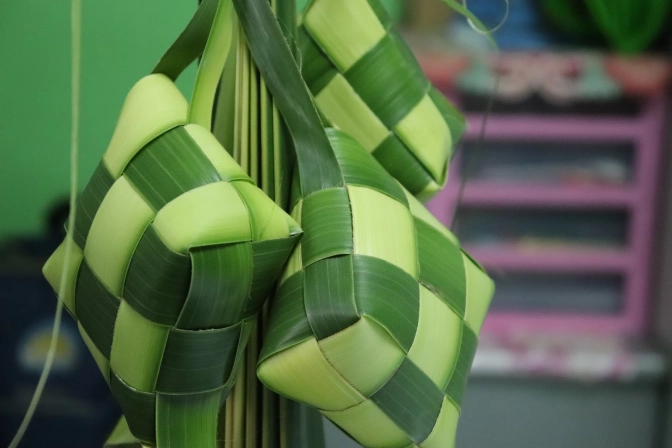
One of the must-have dishes, however, would be the ketupat. Not only served as a dish but also commonly used as a decorative object. Malay mothers often pass the tradition of weaving ketupat cases down to their children. Ketupat cases woven from colourful ribbons also typically adorn Malay homes during this festive period.
Oil Lamps to Attract Spirits and Angels
Oil lamps known as pelita or panjut are lit from the 20th day of Ramadan to attract spirits and angels alike. It is also believed to bring blessings to people’s homes during the night of Lailatul Qadar. These lights continue to shine brightly until the end of the festival.
Nowadays, oil lamps are lit only for decorative purposes. Many families now use LED lights instead!
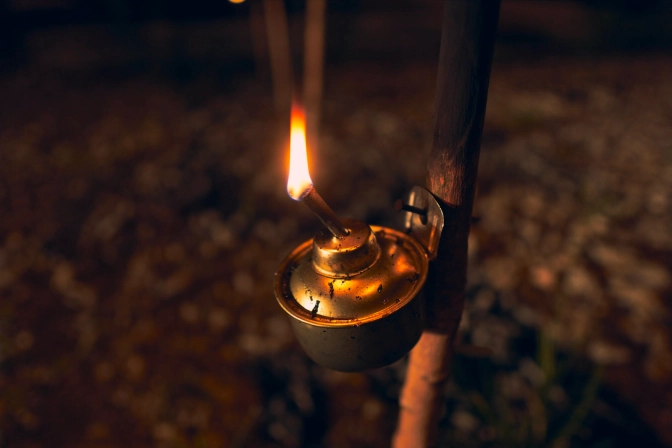
Children Receive Festive Money (Duit Raya)
After seeking forgiveness, children receive ‘duit raya’ in cute little colourful envelopes from older family members. You no longer receive this festive money once you start earning, and you’re expected to give it to the family's younger members when you become a working adult.
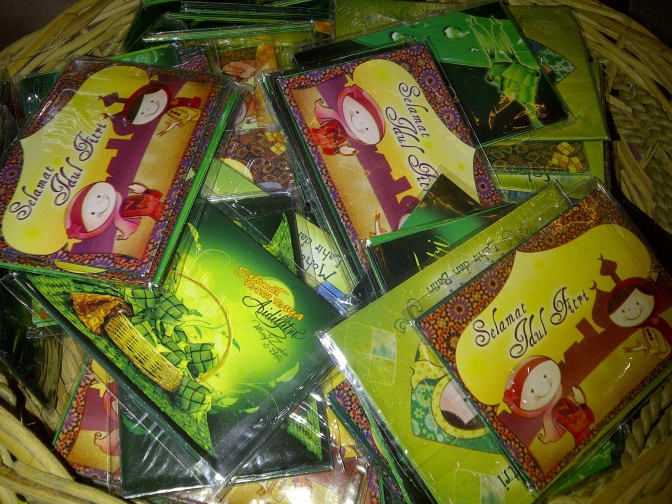
Green packets are given to the elders in the family as a form of respect. Giving green packets is considered an act of charity based on the Islamic concept of zakat, whereby money is described as a share of wealth and an obligation towards society. Zakat inculcates an environment of care and concern for one another.
If you receive a green packet, remember to accept it respectfully and with both hands!
How Should Guests Generally Behave?
Most Muslims in Singapore do not expect guests to present gifts or cash. If guests insist on presenting something, then sweets, cookies or kueh are best and will be appreciated by your hosts!
Guests should also look out for what not to give. Black is a colour to avoid. Of course, wine, champagne, or any other form of alcohol is an absolute no-no!
Non-Muslim guests are not expected to dress in traditional Malay clothes. However, it might please your hosts if you made an effort to do so.
Lack time to shop for a Baju Kebaya or Jubah? Fret not! Wearing casual Western clothing is entirely acceptable! However, keep in mind that the Muslim community here is relatively conservative.
For our female readers, remember not to wear anything too revealing! If you are unsure about the dress code, keep in mind that short skirts and skimpy tops are almost certainly not modest enough for the occasion.
Common Hari Raya Puasa Greetings
‘Selamat Hari Raya’ is the traditional Hari Raya greeting used by Malay Muslims which means ‘Happy Hari Raya’ and ‘Maaf Zahir dan Batin’ which, when translated loosely, means ‘I seek forgiveness from you’.
Many Muslims also say ‘Eid Mubarak’ when they greet each other, a term with Arabic origins. ‘Eid Mubarak’ means ‘Blessed Eid’.
Hopefully, this guide has helped you understand Hari Raya Puasa's various facets and tenets. It can be overwhelming to the uninitiated, especially to all our non-Muslim friends. Remember to stay healthy, positive and have fun during this festive period!
(N.B. While this article is about Ramadan worldwide, many references are to words, sayings and standard practices in Singapore and Malaysia. Any errors and omissions are regretted, and, in the true spirit of Hari Raya, we ask for forgiveness!)
HARI RAYA PUASA. COMPLETED. ✅
Sources:
- https://familiesforlife.sg/celebrate-an-occasion/Pages/Hari-Raya-Customs-that-Bind-Family-and-Community.aspx
- https://sg.theasianparent.com/the-outsiders-guide-to-hari-raya-puasa/amp
- https://www.womensweekly.com.sg/gallery/family/10-fun-facts-know-celebrating-hari-raya-singapore/
- https://hoolah.co/sg-en/blog/why-do-muslim-families-distribute-green-packets-during-hari-raya-puasa/
